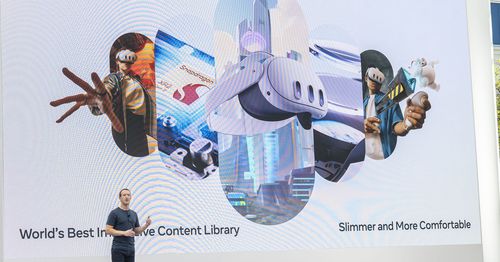A decade after its acquisition by Facebook, Oculus has not transformed the world as anticipated
Annually, Time Magazine compiles an impressive list of the top 200 innovations that have shaped the last 12 months, a Herculean task given the rarity of truly transformative inventions. Discovering such groundbreaking advancements is an extraordinary occurrence, often no more than once a year.
Over a decade ago, the Oculus Rift prototype emerged as one such pioneering invention, appearing initially as a rudimentary device akin to a ski mask hastily assembled with duct tape. Despite its simple presentation, it represented a bold leap into the future, reminiscent of the early days in Silicon Valley where tech enthusiasts pieced together the next big things in cramped garages.
A decade has passed since Meta (formerly known as Facebook) announced its $2 billion acquisition of Oculus, a move that has yet to redefine our world as anticipated. Nevertheless, the journey of VR technology has not been without its merits, navigating a space between revolutionary success and notable failure. As of April 2024, the acquisition's impact finds itself in a nuanced middle ground.
Mark Zuckerberg's vision for Oculus extended beyond gaming into creating a comprehensive platform for a myriad of experiences. He envisaged a world where putting on VR goggles could transport users to live games, global classrooms, or even face-to-face consultations with doctors, heralding the Oculus Rift as a groundbreaking new communication platform. This ambition was on par with the introduction of computers, the internet, and smartphones, highlighting VR's potential as a portal to the metaverse.
 Image: Apple Vision Pro - Unsplash
Image: Apple Vision Pro - Unsplash
The narrative took a significant turn with the introduction of the "Vision Pro" by Apple at WWDC 2024, a moment that not only validated the VR space but also set new standards in the technology's application and user experience. Despite Meta's dominance in the VR market and its commitment to making the technology accessible, the "Vision Pro" emerges as a formidable competitor, distinguished by its high quality and innovative features, even with its higher price point. This development underscores the evolving landscape of VR technology, where the quest for immersive, life-altering experiences continues to drive innovation and competition.
 Why Meta is looking to the fediverse as the future for social media
Why Meta is looking to the fediverse as the future for social media Microsoft’s Surface and Xbox hardware revenues take a big hit in Q3
Microsoft’s Surface and Xbox hardware revenues take a big hit in Q3 Augment, a competitor of GitHub Copilot and backed by Eric Schmidt, emerges from stealth mode with a launch of $252 million
Augment, a competitor of GitHub Copilot and backed by Eric Schmidt, emerges from stealth mode with a launch of $252 million IBM advances further into hybrid cloud management with its $6.4 billion acquisition of HashiCorp
IBM advances further into hybrid cloud management with its $6.4 billion acquisition of HashiCorp Perplexity is raising over $250 million at a valuation of between $2.5 billion and $3 billion for its AI search platform, according to sources.
Perplexity is raising over $250 million at a valuation of between $2.5 billion and $3 billion for its AI search platform, according to sources. Apple announces May 7 event for new iPads
Apple announces May 7 event for new iPads Gurman: iOS 18 AI features to be powered by entirely On-Device LLM, offering privacy and speed benefits
Gurman: iOS 18 AI features to be powered by entirely On-Device LLM, offering privacy and speed benefits Meta aims to become the Microsoft of headsets
Meta aims to become the Microsoft of headsets Tinder introduces a 'Share My Date' feature allowing users to share their date plans with interested friends
Tinder introduces a 'Share My Date' feature allowing users to share their date plans with interested friends This is Tesla's effective solution for the recalled Cybertruck accelerator pedals
This is Tesla's effective solution for the recalled Cybertruck accelerator pedals
